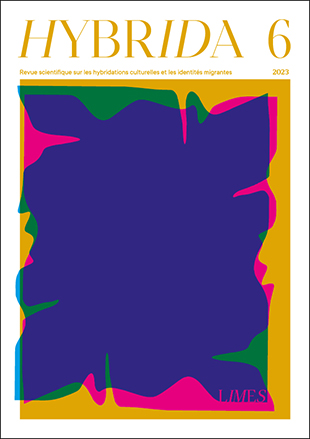Reconstruire les frontières symboliques entre l’Orient et l’Occident : L’occidentalisme dans ‘The Battle on Lake Changjin’
DOI :
https://doi.org/10.7203/HYBRIDA.6.26244Mots-clés :
film de guerre , Chine , propagande , orientalisme , occidentalisme Résumé
Résumé
L’article explore le concept d’occidentalisme et sa représentation dans la récente superproduction chinoise, The Battle at Lake Changjin. L’auteur soutient que le film représente une résurgence de l’occidentalisme dans le cinéma populaire chinois, renforçant le binaire Est-Ouest et promouvant un récit de supériorité chinoise. La discussion commence par une mise en contexte des origines historiques du binaire Est-Ouest et de son rôle dans la formation des identités occidentales et la justification de pratiques telles que le colonialisme. L’article met également en évidence les complexités et les contradictions du film, ainsi que ses implications pour le paysage culturel et politique de la Chine, en particulier le changement d’attitude de la Chine à l’égard de l’Occident pendant le mandat du président Xi Jinping. L’article souligne la fermeture croissante de la mentalité chinoise, illustrée par l’adoption d’une «diplomatie du loup-garou» et la présentation de l’Occident comme un adversaire dans les médias. Cette évolution est également perceptible dans le cinéma populaire chinois, comme en témoignent des films tels que Wolf Warrior 2, qui mettent en scène des protagonistes chinois triomphant de méchants personnages occidentaux. L’auteur souligne la représentation essentialiste des Chinois dans The Battle at Lake Changjin, qui sont moralement et spirituellement supérieurs à leurs homologues occidentaux. En créant une opposition binaire entre l’Orient et l’Occident, le film accentue les différences culturelles et les présente comme insurmontables. En outre, l’article explore la structure narrative du film, ses influences sur le cinéma occidental et chinois, et la représentation des personnages clés, notamment le général Douglas MacArthur et Mao Zedong.
 Téléchargements
Téléchargements
 Références
Références
Berry, C. (2018). Wolf Warrior 2: Imagining the Chinese Century. Film Quarterly, 72(2), 38–44. https://doi.org/10.1525/fq.2018.72.2.38
Bonnett, A. (2004). The Idea of the West: Culture, Politics and History. Palgrave Macmillan.
Brzeski, P. (2021, October 11). China Box Office: ‘Battle at Lake Changjin’ Marches Past $600M. The Hollywood Reporter. https://www.hollywoodreporter.com/movies/movie-news/battle-at-lake-changjin-box-office-1235029428/
Chen, X. (2002). Occidentalism: A Theory of Counter-discourse in Post-Mao China. Rowman & Littlefield.
Gates, P. (2005). “Fighting the Good Fight:” The Real and the Moral in the Contemporary Hollywood Combat Film. Quarterly Review of Film and Video, 22(4), 297–310. https://doi.org/10.1080/10509200590475788
Guan, F. (2022). The Art of War. Dissent Magazine. https://www.dissentmagazine.org/article/the-art-of-war
Lemaître. (2022, October 16). The West, China’s designated enemy. Le Monde.Fr. https://www.lemonde.fr/en/international/article/2022/10/16/the-west-china-s-designated-enemy_6000533_4.html
Liu, K. (2003). Globalization and Cultural Trends in China. University of Hawaii Press.
Maxwell, A. (2011). The East-West Discourse: Symbolic Geography and Its Consequences. Peter Lang.
Nicieja, S. (2018). Lessons from the East: Representations of East Asia in Contemporary Anglophone Films and Novels. Peter Lang.
Pottinger, M., Johnson, M., & Feith, D. (2022, November 30). Xi Jinping in His Own Words. Foreign Affairs. https://www.foreignaffairs.com/china/xi-jinping-his-own-words
Said, E. W. (2003). Orientalism: Western Conceptions of the Orient. Penguin Books.
Teo, S. (2019). The Chinese film market and the Wolf Warrior 2 phenomenon. Screen, 60(2), 322–331. https://doi.org/10.1093/screen/hjz017
Why China is turning away from English. (2022, April 12). The Economist. https://www.economist.com/china/2022/04/13/why-china-is-turning-away-from-english
Téléchargements
Publiée
Comment citer
-
Résumé417
-
HTML 1024
-
PDF 234
Numéro
Rubrique
Licence
Tous les documents de la plateforme OJS sont en libre accès et propriété de leurs auteurs respectifs.
Les auteurs publiant dans la revue acceptent les conditions suivantes :
- Les auteurs conservent les droits et garantissent à HYBRIDA le droit d'être la première publication du document, sous licence de Creative Commons d'Attribution - Pas d’Utilisation Commerciale - Partage dans les Mêmes Conditions 4.0 International (CC BY-NC-SA 4.0) qui permet à d'autres de partager le travail avec une reconnaissance de l'auteur et de la publication dans le journal.
- Les auteurs sont autorisés et encouragés à diffuser leur travail (une fois publié) par voie électronique en utilisant des sites Web personnels ou institutionnels (archives ouvertes institutionnelles, sites Web personnels ou profils de réseaux professionnels et universitaires) une fois le texte publié.



